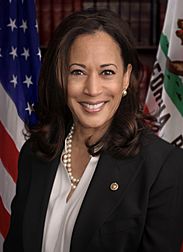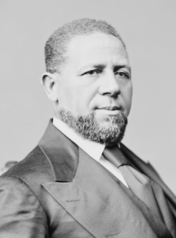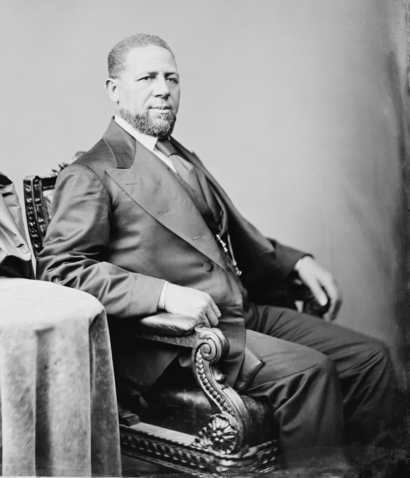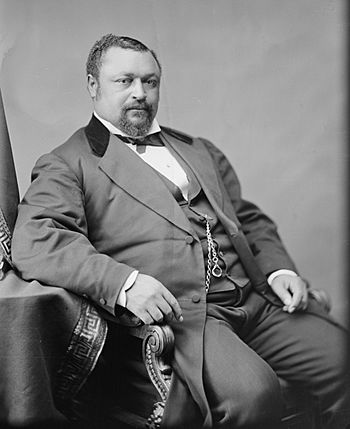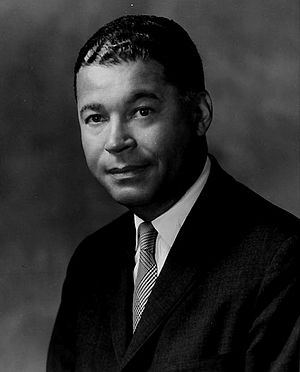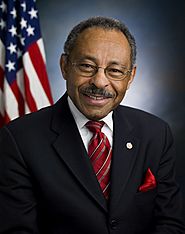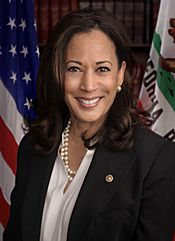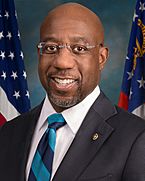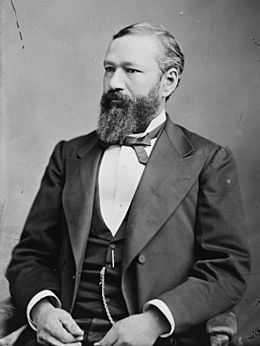List of African-American United States senators facts for kids
This article lists the African Americans who have served in the United States Senate. The Senate is an important part of the U.S. government. So far, 12 African Americans have been elected or appointed to this role. Two served in the 1800s, and two in the 1900s.
Three of these 12 senators held a specific type of Senate seat for Illinois. One of them was Barack Obama, who later became President of the United States. This means Illinois has had the most African American U.S. senators.
In 2016, Kamala Harris made history. She became the first African American to be elected a U.S. senator from California. Later, she became the first African American Vice President of the United States. This also made her the first African American to lead the U.S. Senate meetings.
Out of the 12 African American senators, seven were chosen by popular vote. This means people voted directly for them. Two were chosen by their state's lawmakers before 1913. That's when a new rule, the Seventeenth Amendment, made it so people would vote directly for senators. Three senators were chosen by a state governor to fill a spot, but they were not later elected by voters.
Contents
- Understanding the U.S. Senate
- A Look Back: Early Senators to Obama
- Modern Day Senators: 2013–Present
- List of African-American U.S. senators
- African Americans elected to the United States Senate, but not seated
- List of states represented by African Americans
- Graphs
- Elections with two African-American major-party nominees
- See Also
Understanding the U.S. Senate
The United States Senate is like the "upper house" of the United States Congress. Think of Congress as the main law-making group for the U.S. government. It has two parts: the Senate and the House of Representatives.
The term "African Americans" usually means people in the United States who have family roots in Africa. This often refers to people whose ancestors came from parts of Africa south of the Sahara Desert.
When the U.S. government first started, African Americans were not treated as full citizens. Many were forced into slavery. No African American held a federal elected job until 1870. This was after the Fifteenth Amendment was added to the United States Constitution. This amendment made it illegal for governments to stop any citizen from voting because of their race or color.
A Look Back: Early Senators to Obama
The first two African American senators were from Mississippi. They served after the American Civil War, during a time called the Reconstruction era. Hiram Rhodes Revels was the very first African American to serve in the Senate. He was chosen in 1870 by Mississippi's state lawmakers. Some senators tried to stop him from taking his seat. They used an old court case from 1857 that said Black people were not citizens. But most senators voted for Revels to be seated.
In 1872, P. B. S. Pinchback was chosen by Louisiana's state lawmakers for the Senate. However, there were problems with the elections in Louisiana. Because of this, Pinchback was never allowed to take his seat in Congress.
Mississippi's lawmakers chose Blanche Bruce in 1875. He was the first African American to serve a full six-year term. He was also the only senator who had been enslaved. But in 1876, Republicans lost power in Mississippi. Bruce was not chosen for a second term. By 1890, Mississippi and other Southern states passed new laws. These laws took away the voting rights of most Black citizens. This unfair situation continued until the 1960s. That's when new federal laws, like the Voting Rights Act of 1965, helped protect voting rights.
The next Black U.S. senator, Edward Brooke from Massachusetts, started his term in 1967. He was the first African American to be chosen by popular vote. This happened after the 1913 rule change (the Seventeenth Amendment) that made people vote directly for senators. Brooke was a Republican. He was also the first Black senator to serve two terms, staying in office until 1979. After he left, there were no Black members in the U.S. Senate for 14 years.
Between 1993 and 2010, three Black members of the Democratic Party from Illinois held the same Senate seat at different times. Carol Moseley Braun joined the Senate in 1993. She was the first African American woman to serve in the Senate. She served one term. Barack Obama became a senator in 2005. In 2008, he became the first African American to be elected president of the United States. When Obama became president, he left his Senate seat. Roland Burris, also an African American, was chosen to finish Obama's term. Burris did not run for election after his appointment. From 2011 to 2013, there were no Black senators again.
Modern Day Senators: 2013–Present
After Obama became president, the next two Black senators were Tim Scott from South Carolina and Mo Cowan from Massachusetts. Both were chosen by their state governors to fill empty spots. This meant that 2013 was the first time in history that more than one African American served in the Senate at the same time.
On October 16, 2013, people in New Jersey elected Cory Booker in a special election. He filled the seat of a senator who had passed away. When Booker took office, he was the first African American senator elected since Obama. He was also the first to represent New Jersey. He was later elected for a full six-year term in 2014. Tim Scott also kept his seat in a special election in 2014 and won a full term in 2016.
In 2017, Scott and Booker were joined by Kamala Harris from California. Harris was the second African American woman to serve in the Senate. In 2020, she was elected as the first female Vice President of the United States. In 2021, Raphael Warnock from Georgia was elected. He was the first African American Democrat to represent a former Confederate state in the Senate.
As of 2025, there have been over 2,000 members of the United States Senate, of which 14 have been African American.
List of African-American U.S. senators
| Image | Senator | State | Tenure | Party | Congress | Notes | |||
|---|---|---|---|---|---|---|---|---|---|
| Start | End | Duration | |||||||
|
|
Hiram Rhodes Revels (1827–1901) |
Mississippi | February 25, 1870 | March 3, 1871 | 1 year, 7 days | Republican | 41st (1869–1871) |
Elected to complete an unfinished term after Mississippi was readmitted to the Union on February 23, 1870. First African American to serve in the United States Senate and Congress. Retired. | |
|
|
Blanche Bruce (1841–1898) |
Mississippi | March 4, 1875 | March 4, 1881 | 6 years, 0 days | Republican | 44th (1875–1877) |
First African American to serve a full six-year term as a United States senator. The only senator to be a former slave. Retired. | |
| 45th (1877–1879) |
|||||||||
| 46th (1879–1881) |
|||||||||
|
|
Edward Brooke (1919–2015) |
Massachusetts | January 3, 1967 | January 3, 1979 | 12 years, 0 days | Republican | 90th (1967–1969) |
First African American elected to the Senate by direct election. First African American to serve in Congress from Massachusetts. Lost reelection. | |
| 91st (1969–1971) |
|||||||||
| 92nd (1971–1973) |
|||||||||
| 93rd (1973–1975) |
|||||||||
| 94th (1975–1977) |
|||||||||
| 95th (1977–1979) |
|||||||||
|
|
Carol Moseley Braun (born 1947) |
Illinois | January 3, 1993 | January 3, 1999 | 6 years, 0 days | Democratic | 103rd (1993–1995) |
First African-American female and African-American Democrat to serve in the United States Senate. First African American to serve in the Senate from Illinois. Lost reelection. | |
| 104th (1995–1997) |
|||||||||
| 105th (1997–1999) |
|||||||||
|
|
Barack Obama (born 1961) |
Illinois | January 3, 2005 | November 16, 2008 | 3 years, 318 days | Democratic | 109th (2005–2007) |
First African-American senator to be elected President of the United States. Resigned following election as president. | |
| 110th (2007–2009) |
|||||||||
|
|
Roland Burris (born 1937) |
Illinois | January 15, 2009 | November 29, 2010 | 1 year, 318 days | Democratic | 111th (2009–2011) |
Appointed by Illinois Governor Rod Blagojevich to fill vacancy caused by the resignation of President-elect Barack Obama. First African American to succeed another African American in the Senate. Not a candidate during special election following his appointment. | |
|
|
Tim Scott (born 1965) |
South Carolina | January 2, 2013 | Incumbent | 13 years, 62 days | Republican | 112th (2011–2013) |
Appointed by South Carolina Governor Nikki Haley to fill vacancy caused by the resignation of Jim DeMint. First African American to serve in the Senate from South Carolina. First African American to serve in both chambers of the United States Congress. | |
| 113th (2013–2015) |
|||||||||
| 114th (2015–2017) |
|||||||||
| 115th (2017–2019) |
|||||||||
| 116th (2019–2021) |
|||||||||
| 117th (2021–2023) |
|||||||||
| 118th (2023–2025) |
|||||||||
| 119th (2025–present) |
|||||||||
|
|
Mo Cowan (born 1969) |
Massachusetts | February 1, 2013 | July 16, 2013 | 165 days | Democratic | 113th (2013–2015) |
Appointed by Massachusetts Governor Deval Patrick to fill vacancy caused by the resignation of John Kerry. Not a candidate during special election following his appointment. First African-American senator appointed by an African-American governor. The first African American to serve alongside another African-American senator: Tim Scott. Retired. | |
|
|
Cory Booker (born 1969) |
New Jersey | October 31, 2013 | Incumbent | 12 years, 125 days | Democratic | 113th (2013–2015) |
First African American to serve in the Senate from New Jersey. First African American to be elected to the Senate by special election. | |
| 114th (2015–2017) |
|||||||||
| 115th (2017–2019) |
|||||||||
| 116th (2019–2021) |
|||||||||
| 117th (2021–2023) |
|||||||||
| 118th (2023–2025) |
|||||||||
| 119th (2025–present) |
|||||||||
|
|
Kamala Harris (born 1964) |
California | January 3, 2017 | January 18, 2021 | 4 years, 15 days | Democratic | 115th (2017–2019) |
First African American to serve in the Senate from California. First African-American senator to be elected as Vice President. Resigned following election as Vice President of the United States. | |
| 116th (2019–2021) |
|||||||||
| 117th (2021–2023) |
|||||||||
|
|
Raphael Warnock (born 1969) |
Georgia | January 20, 2021 | Incumbent | 5 years, 44 days | Democratic | 117th (2021–2023) |
First African American to serve in the Senate from Georgia. | |
| 118th (2023–2025) |
|||||||||
| 119th (2025–present) |
|||||||||
|
|
Laphonza Butler (born 1979) |
California | October 3, 2023 | December 8, 2024 | 1 year, 66 days | Democratic | 118th (2023–2025) |
Appointed by Governor Gavin Newsom to fill the vacancy created by the death of Senator Dianne Feinstein. First openly LGBT African-American senator. Not a candidate for election. Resigned. | |
 |
Angela Alsobrooks (born 1971) |
Maryland | January 3, 2025 | Incumbent | 1 year, 61 days | Democratic | 119th (2025–present) |
First African American to serve in the Senate from Maryland. First African-American woman to serve alongside another African-American woman in the Senate: Lisa Blunt Rochester. | |
|
|
Lisa Blunt Rochester (born 1962) |
Delaware | January 3, 2025 | Incumbent | 1 year, 61 days | Democratic | 119th (2025–present) |
First African American to serve in the Senate from Delaware. First African-American woman to serve alongside another African-American woman in the Senate: Angela Alsobrooks. | |
African Americans elected to the United States Senate, but not seated
| Image | Senator-elect | State | Year elected | Party | Congress | Notes | |
|---|---|---|---|---|---|---|---|
|
|
P. B. S. Pinchback (1837–1921) |
Louisiana | 1873 | Republican | 44th (1875–1877) |
Denied seat due to a contested election that involved William L. McMillen. | |
List of states represented by African Americans
Seven states have been represented by black senators. As of January 3, 2025, five states are represented by black senators.
| State | Current | Previous | Total | First black senator | Years represented by black senators | Year first elected a black senator |
|---|---|---|---|---|---|---|
| California | 0 | 2 | 2 | Kamala Harris | 2017–2021, 2023–2024 | 2016 |
| Delaware | 1 | 0 | 1 | Lisa Blunt Rochester | 2025–present | 2024 |
| Georgia | 1 | 0 | 1 | Raphael Warnock | 2021–present | 2021 |
| Illinois | 0 | 3 | 3 | Carol Moseley-Braun | 1993–1999, 2005–2008, 2009–2010 | 1992 |
| Maryland | 1 | 0 | 1 | Angela Alsobrooks | 2025–present | 2024 |
| Massachusetts | 0 | 2 | 2 | Edward Brooke | 1967–1979, 2013 | 1966 |
| Mississippi | 0 | 2 | 2 | Hiram Rhodes Revels | 1870–1871, 1875–1881 | 1870 (by state legislature) |
| New Jersey | 1 | 0 | 1 | Cory Booker | 2013–present | 2013 |
| South Carolina | 1 | 0 | 1 | Tim Scott | 2013–present | 2014 |
Graphs
The histogram below sets forth the number of African Americans who served in the United States Senate during the periods provided.
| Starting | Total | Graph |
|---|---|---|
| March 4, 1789 | 0 | |
| February 25, 1870 | 1 | ❚ |
| March 4, 1871 | 0 | |
| March 4, 1875 | 1 | ❚ |
| March 4, 1881 | 0 | |
| January 3, 1967 | 1 | ❚ |
| January 4, 1979 | 0 | |
| January 3, 1993 | 1 | ❚ |
| January 4, 1999 | 0 | |
| January 3, 2005 | 1 | ❚ |
| November 17, 2008 | 0 | |
| January 15, 2009 | 1 | ❚ |
| November 30, 2010 | 0 | |
| January 2, 2013 | 1 | ❚ |
| February 1, 2013 | 2 | ❚❚ |
| July 17, 2013 | 1 | ❚ |
| October 31, 2013 | 2 | ❚❚ |
| January 3, 2017 | 3 | ❚❚❚ |
| January 18, 2021 | 2 | ❚❚ |
| January 20, 2021 | 3 | ❚❚❚ |
| October 3, 2023 | 4 | ❚❚❚❚ |
| December 8, 2024 | 3 | ❚❚❚ |
| January 3, 2025 | 5 | ❚❚❚❚❚ |
Elections with two African-American major-party nominees
| Election year | State | Winner | Second-place finisher |
|---|---|---|---|
| 2004 | Illinois | Barack Obama | Alan Keyes |
| 2014 | South Carolina | Tim Scott | Joyce Dickerson |
| 2016 | South Carolina | Tim Scott | Thomas Dixon |
| 2022 | Georgia | Raphael Warnock | Herschel Walker |
| South Carolina | Tim Scott | Krystle Matthews | |
| Note: Incumbent Senators are in bold | |||
See Also
- Federal Government
- African Americans in the United States Congress
- List of African-American United States Cabinet members
- List of African American firsts
- State and Local Government



